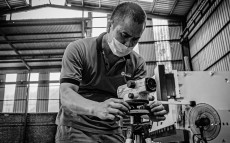- pathfindersAI
- Job Profile
Dental Laboratory Technicians
Summary
Dental Laboratory Technicians: Crafting Smiles with Precision
What They Do
Dental Laboratory Technicians (DLTs) are vital members of the dental healthcare team, working diligently behind the scenes to create dental prosthetics, appliances, and restorations. Their primary role involves crafting items such as crowns, bridges, dentures, and orthodontic devices that restore function and aesthetics to patients' teeth. These highly skilled professionals combine artistic talent with technical expertise to custom-design dental pieces that meet the unique needs of each patient. By utilizing materials such as ceramics, metals, and plastics, DLTs play a crucial role in improving patients' oral health, appearance, and self-esteem.
Job Responsibilities
The responsibilities of a Dental Laboratory Technician are multifaceted and require great attention to detail. Daily tasks include interpreting prescriptions and instructions from dentists, creating molds and models of patients' teeth, and shaping and fitting dental prosthetics. DLTs meticulously carve, assemble, and polish dental appliances, ensuring they accurately replicate natural teeth in form and function. Precision in measuring and mixing materials is paramount, as is the ability to expertly use specialized tools and equipment, from lathes to furnaces. Additionally, DLTs must often keep accurate records of their work and maintain a sterile and organized workspace to prevent any contamination.
Essential Skills
Successfully navigating the role of a Dental Laboratory Technician demands a unique blend of skills. Manual dexterity and attention to detail are essential, as the work involves delicate procedures requiring steady hands and keen eyes. An understanding of dental anatomy and materials science ensures that technicians can replicate the intricate structures of teeth accurately. Creativity and artistic ability are also vital, as DLTs need to design aesthetically pleasing prosthetics that blend seamlessly with natural teeth. Strong problem-solving skills and the ability to follow precise instructions from dentists further support the creation of effective dental appliances. Lastly, proficiency in using computerized design software is increasingly important, given the growing use of digital technology in dental laboratories.
Educational Pathways
Aspiring Dental Laboratory Technicians can pursue several educational pathways to enter this rewarding field. Many begin their journey with a high school diploma, followed by specialized training in dental laboratory technology through accredited programs. These programs, often available at community colleges and technical schools, typically confer an associate degree or a certificate in dental laboratory technology. Coursework includes dental materials, anatomy, dental ceramics, and laboratory procedures. Clinical experience is a crucial component, allowing students to develop hands-on skills in a supervised setting. Furthermore, certification from recognized bodies, such as the National Board for Certification in Dental Laboratory Technology (NBC), can enhance job prospects and demonstrate a commitment to professional standards.
Career Prospects
The demand for Dental Laboratory Technicians is expected to remain steady, with growth driven by an aging population and advances in dental technology. As more people retain their natural teeth longer and seek cosmetic dental services, the need for skilled technicians will continue to rise. Employment opportunities can be found in various settings, including private dental laboratories, dental offices, hospitals, and manufacturers of dental products. With experience, DLTs can advance to supervisory or managerial roles, or even start their own dental laboratories. Continuing education and specialization in areas such as orthodontics, prosthodontics, or ceramics can further enhance career prospects and earning potential.
Conclusion
In conclusion, Dental Laboratory Technicians play an indispensable role in the dental healthcare field. Through their meticulous craftsmanship and dedication, they contribute significantly to improving patients' oral health and quality of life. The blend of artistic skill and technical precision required in this profession makes it both challenging and rewarding. For those with a passion for detail-oriented work and a desire to make a tangible difference in people's lives, a career as a Dental Laboratory Technician offers a promising and fulfilling pathway.
Video
Compensation
| State | Median Salary | Median Hourly | Positions |
|---|---|---|---|
| AL | 36,810 | 17.70 | 790 |
| AZ | 51,030 | 24.53 | 820 |
| AR | 44,590 | 21.44 | 810 |
| CA | 48,670 | 23.40 | 4,490 |
| CO | 58,160 | 27.96 | 380 |
| CT | 47,610 | 22.89 | 90 |
| DC | 103,370 | 49.70 | 40 |
| FL | 49,030 | 23.57 | 2,410 |
| GA | 46,370 | 22.29 | 1,240 |
| HI | 36,300 | 17.45 | 130 |
| ID | 55,080 | 26.48 | 170 |
| IL | 49,380 | 23.74 | 970 |
| IN | 44,450 | 21.37 | 900 |
| IA | 48,850 | 23.49 | 380 |
| KS | 49,910 | 23.99 | 480 |
| KY | 38,770 | 18.64 | 340 |
| LA | 34,290 | 16.48 | 620 |
| ME | 54,680 | 26.29 | 150 |
| MD | 49,190 | 23.65 | 460 |
| MA | 61,220 | 29.43 | 230 |
| MI | 46,160 | 22.19 | 1,150 |
| MN | 49,710 | 23.90 | 440 |
| MS | 45,460 | 21.86 | 110 |
| MO | 47,660 | 22.92 | 920 |
| MT | 47,670 | 22.92 | 210 |
| NE | 46,860 | 22.53 | 300 |
| NV | 61,240 | 29.44 | 270 |
| NH | 50,520 | 24.29 | 190 |
| NJ | 49,360 | 23.73 | 720 |
| NM | 41,480 | 19.94 | 130 |
| NY | 48,440 | 23.29 | 2,590 |
| NC | 46,670 | 22.44 | 990 |
| ND | 50,720 | 24.38 | 70 |
| OH | 46,910 | 22.55 | 880 |
| OK | 50,310 | 24.19 | 360 |
| OR | 47,090 | 22.64 | 750 |
| PA | 50,470 | 24.26 | 1,170 |
| RI | 48,830 | 23.48 | 90 |
| SC | 40,830 | 19.63 | 530 |
| SD | 46,590 | 22.40 | 100 |
| TN | 41,840 | 20.12 | 780 |
| TX | 39,050 | 18.77 | 1,750 |
| UT | 47,280 | 22.73 | 870 |
| VA | 48,840 | 23.48 | 780 |
| WA | 56,760 | 27.29 | 940 |
| WV | 40,260 | 19.36 | 120 |
| WI | 46,940 | 22.57 | 770 |
Similar Occupations
In this area you will find other occupations that are close to the one you were viewing in tasks, knowledge and work environment. If the primary job profile you are viewing isn't quite to your liking, take a look around and see what else is available.
Basic and Premium Accounts have more alternative occupations available than the Free account.

Calibration Technologists and Technicians - 17-3028.00
Calibration Technologists and Technicians are responsible for testing, maintaining, and adjusting precision instruments and equipment to ensure their accuracy and functionality. They meticulously calibrate a variety of devices, ensuring they meet established standards and specifications necessary for optimal performance.
-
$62,790/yr
Median Pay -
13,220
Number of Jobs

Dental Assistants - 31-9091.00
Dental Assistants support dentists in a variety of tasks, including preparing patients for procedures, sterilizing instruments, and taking dental X-rays. They also assist during dental procedures, manage patient records, and provide patient education on oral hygiene.
-
$46,540/yr
Median Pay -
370,690
Number of Jobs